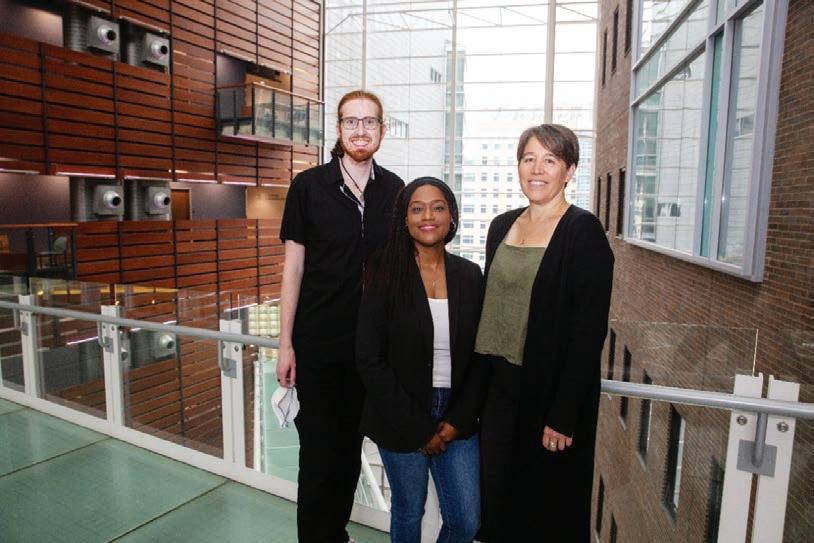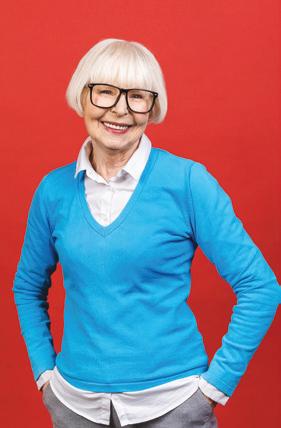
3 minute read
Littleton’s Timothy White researches cognitive deficits he lives with
BY SHEA VANCE SVANCE@COLORADOCOMMUNITYMEDIA.COM
Although his roots are in Colorado, where he is pursuing a degree at the University of Colorado Denver, Timothy White spent the summer at the University of Cincinnati in Ohio researching chemotherapy-induced cognitive de cits.
In addition to his passion for neuroscience, he brings a unique personal experience to the lab: almost a decade ago at the age of 18, he was diagnosed with the type of cancer — acute lymphoblastic leukemia — he is researching, and he continues to live with cognitive de cits associated with several years of chemotherapy.
“Chemotherapy-induced cognitive impairment, or the mechanisms of cognitive de cits associ- ated with any cancer, it’s very under researched,” White said.
White grew up in Littleton, having been homeschooled through high school before pursuing psychology at Arapahoe Community College. He personally struggles with two of the main de cits that he studies in mice: executive function and memory.
White has been a student of science for several years now, having earned an associate’s degree in psychology from ACC before starting at CU Denver, where he is now working toward a bachelor’s of psychology. It wasn’t until about a year ago when he decided “on a whim” to pursue neuroscience studies at a convention in San Diego.
“I noticed there was a presentation being done on an ALL leukemia mice model, and I was like ‘oh,
that’s super cool,’” White said.
Although he had to catch a ight back home before the presentation, he arranged to meet for co ee with the speaker, Dr. Teresa Reyes from the University of Cincinnati, to talk about her research.

After the conference, he knew he wanted to study chemotherapyinduced cognitive de cits in graduate school, and he started looking into applications. He stumbled upon a webpage for the University of Cincinnati’s Rise Up program for neuroscience, headed by Reyes. With only hours before the application window closed, White gathered last-minute letters of recommendation and applied.
Now, at the close of his summer research position, he feels the lab has made real progress, not only in their internal studies, but in the eld at large. By taking previous research methods a step further and inducing both sexes of mice with leukemia before treating with chemotherapy, White said the lab in Cincinnati is providing a more accurate and practical look at chemotherapy-induced cognitive de cits.
“ ey’re already trying out new diets to try and create a preventative bu er,” White said. “ is isn’t just ‘yes, we want to understand what’s happening in the brain.’ ey are already using this model to try and nd preventative measures and create some kind of extra leg-up on preventing cognitive de cits following treatment.”
White’s struggle with memory continues to be a barrier in his education, but he said that his research cohort has shown support.
“If I’m feeling stressed or anxious or I’m having trouble doing something, everyone in the lab has been more than happy to jump in and help me in whatever ways that I need, and I think that is the environment they would have even if I wasn’t there,” White said. “Everybody there wants to help each other and collaborate.
White has stumbled upon a few surprises — personal and professional — along the way, one of which was the discovery that he actually enjoys living in Ohio.
“I love it here in Cincinnati. I don’t like it when I go too far out of Cincinnati, but Cincinnati is great,” White said.
He also found that he was “freak- prepared for the research position.
“I feel like every time you start a new job, you have to, like, mentally fortify yourself and get to a point where you feel like you belong,” he said.
“For me personally it’s like OK, I have this memory disorder, I’m an undergrad, I do have research experience but I haven’t worked with genes. ere are all of these things and then when I got here and started working, it was like ‘okay, this is doable.’”
In a research capacity, he unexpectedly found gender-speci c neurological di erences in the mice resulting from the chemotherapy. He said the lab is still unsure about what these ndings mean, but that it’s “really interesting and very strange.”
He now prepares to return to CU Denver for the start of classes, where he will continue working in a neuroscience lab studying alcohol and social bu ering. He looks forward to bringing some new gene-related research skills back to Denver.
As he prepares to nish his bachelor’s degree — hopefully this coming spring, he said — he is looking to grad school, and the University of Cincinnati is at the top of his list. He is also looking at some schools in his home state.
Less than a year after a spontaneous trip to San Diego for a neuroscience conference, White has found a place in a deeply personal eld of research, and is only at the beginning of his journey into cognitive science.














